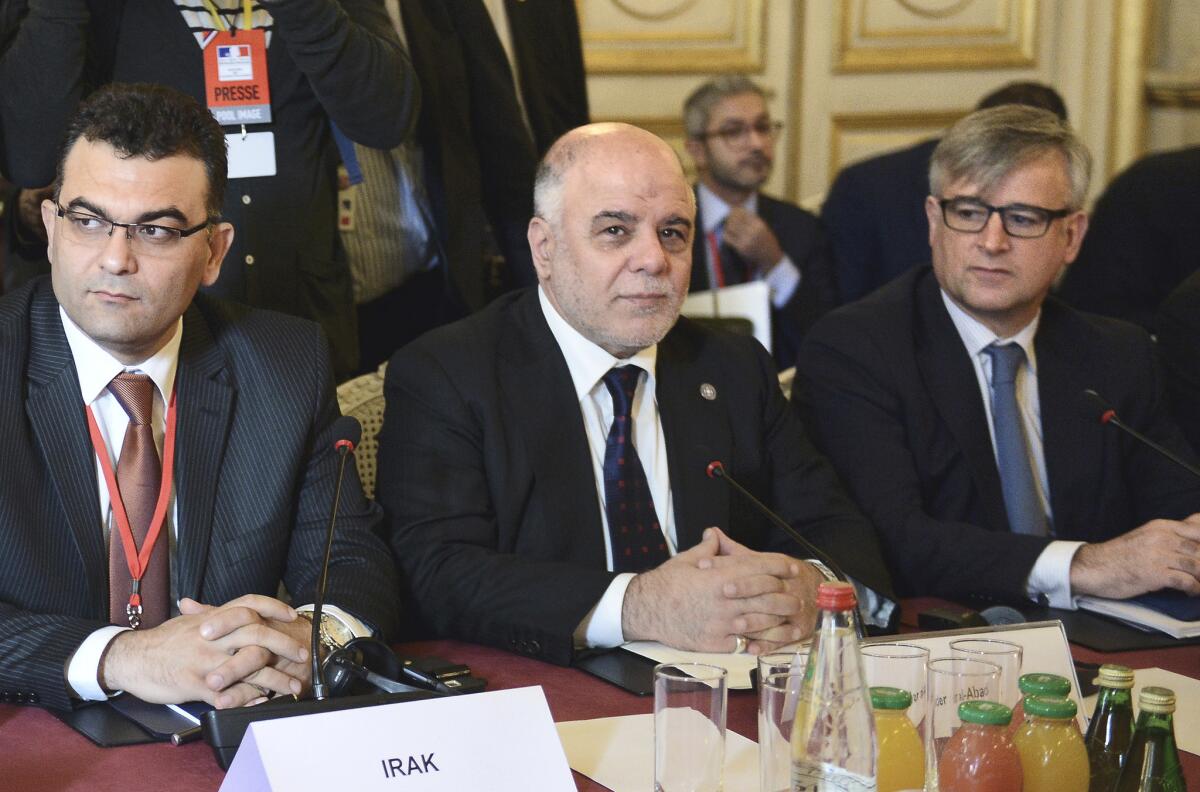U.S., allies pledge to step up security backing for Iraq

Iraqi Prime Minister Haider Abadi, center, and members of the anti-Islamic State coalition meet in Paris to discuss strategy on June 2.
- Share via
Reporting from Beirut — Iraqi Prime Minister Haider Abadi received fresh pledges from the United States and its allies Tuesday to expedite arms deliveries to Iraq, stem the flow of foreign fighters into the country and cut off the financial pipeline of Islamic State militants.
Abadi had complained at a security conference in Paris that the global response had been inadequate at a time when the extremists were seizing territory in Iraq and neighboring Syria.
“I think this is a failure on the part of the world,” Abadi told reporters before the start of the conference, which included the United States and about two dozen allied nations. “There is a lot of talk of support for Iraq, [but] there is very little on the ground.”
Recent Islamic State advances in Iraq’s Anbar province and in Syria have raised grave doubts about the effectiveness of the current strategy to defeat the Al Qaeda breakaway faction. Islamic State arose from the tumult of the Syrian war and last year advanced across vast stretches of Iraq.
As the conference wrapped up Tuesday, Abadi appeared with U.S. and French representatives at a news conference and assumed a conciliatory tone. The Iraqi leader, who came to office last year with strong U.S. backing, said he had been assured that international allies “are determined to continue to help Iraq.”
Abadi had urged his allies to take more steps to choke off Islamic State’s major income sources — including black market sales of oil and looted antiquities. He also called for more stringent steps to curb the influx of foreign fighters into Iraq. Most militant recruits enter Syria from Turkey and then cross into Iraq, security officials say.
The United States vowed to “keep the pressure” on Islamic State and pledged to expedite deliveries to Iraq of antitank rockets, cut Islamic State’s funding streams and reduce the flow of foreign fighters, said U.S. Deputy Secretary of State Antony Blinken.
The moves outlined were not bold new steps but rather a continuation of the strategy in Iraq.
Neither the United States nor its allies are keen to send combat troops to Iraq. Many Iraqis also reject the presence of foreign forces.
At the Paris session, Western diplomats also backed Iraq’s plan to retake Anbar province, west of Baghdad, the capital. Islamic State occupies much of the province, considered the nation’s Sunni heartland. Last month, the extremists overran Ramadi, the provincial seat, in a humiliating blow for Abadi’s government.
The Iraqi blueprint to retake Anbar “is the right plan both militarily and politically for Iraq,” said Blinken, who was sitting in for Secretary of State John F. Kerry as Kerry recovered from a bicycling accident.
Baghdad says thousands of Sunni tribal fighters will take part in the announced offensive to retake Ramadi. Still, highly motivated and predominantly Shiite militias known as popular mobilization forces are expected to take the lead in the Ramadi counteroffensive, a fact that has led to fears of inflaming sectarian tensions.
Western governments have urged Abadi’s Shiite-dominated administration to do more to bolster reconciliation with Iraq’s disaffected Sunni minority. Some Iraqi Sunnis alienated from the central government have welcomed Islamic State, an ultra-fundamentalist Sunni movement that views Shiites as heretics.
The generally upbeat assessments offered in Paris were somewhat at odds with grim battlefield reports in Iraq and Syria. But Blinken said the militants control about 25% less territory than they held last summer.
While pledging to aid Iraq, the allies offered no remedy publicly to one of Abadi’s major complaints — that Iraq has been thwarted in efforts to buy arms from Iran and Russia because of Western-led economic sanctions against the two nations.
Neither Russia nor Iran is part of the U.S.-led alliance in Iraq; neither nation was represented in the Paris conference. Nor was the Syrian government of President Bashar Assad, a close ally of Iran and Russia.
The United States says it does not coordinate with the Iranian or Syrian governments, both of which are also involved in the campaign against Islamic State. The Baghdad government, however, lauds military and other aid from Iran as a crucial component in its battle against Islamic State.
A U.S.-led coalition has conducted more than 4,100 aerial bombing raids targeting Islamic State positions in Iraq and Syria. The United States and its allies have also stepped up arms supplies to the Iraqi government and are engaged in a large-scale training program for Iraqi security forces. But the effort remains far from achieving President Obama’s goal to “degrade and ultimately destroy” Islamic State.
“It is a long battle that we are waging in Iraq,” French Foreign Minister Laurent Fabius said.
Twitter: @mcdneville
More to Read
Sign up for Essential California
The most important California stories and recommendations in your inbox every morning.
You may occasionally receive promotional content from the Los Angeles Times.










